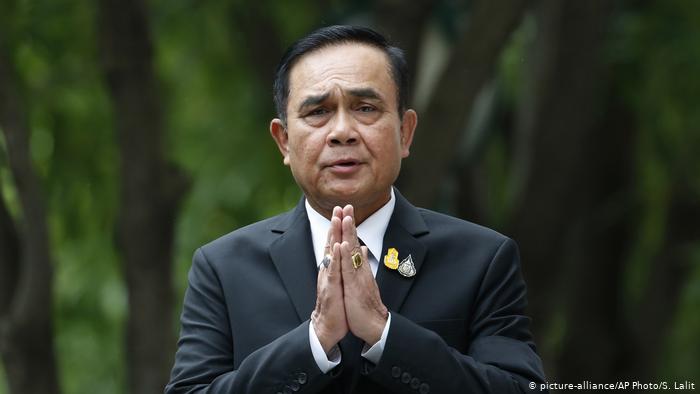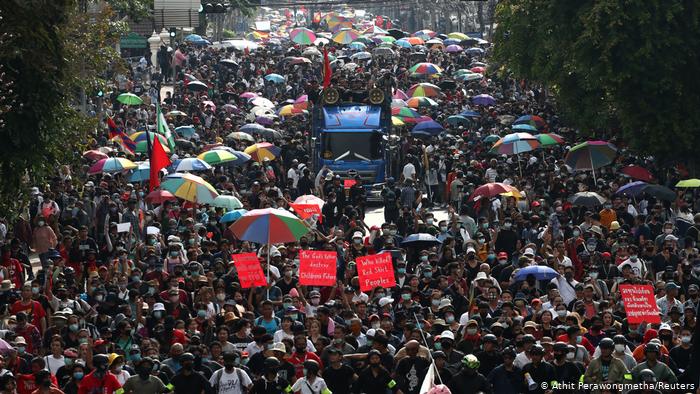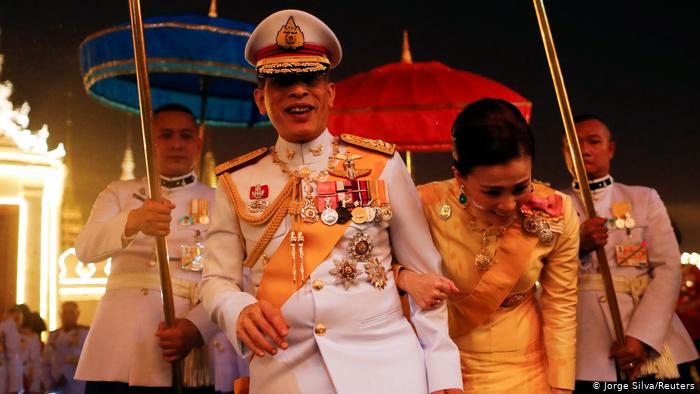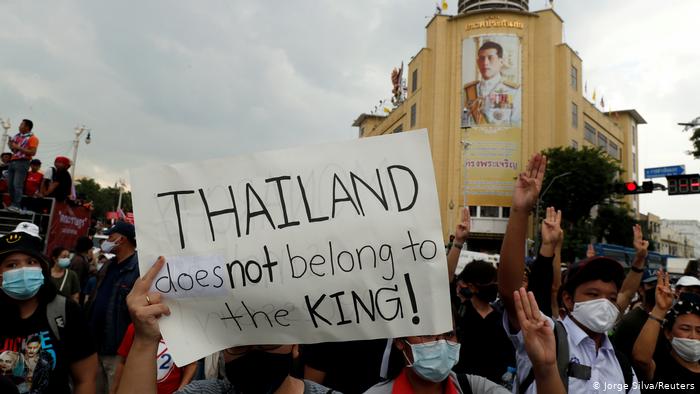The emergency decree restricts transport, publication of "sensitive news" and gives police and soldiers authority to resolve the "emergency situation." The move follows anti-government protests in Bangkok.
Thailand's prime minister, Prayuth Chan-ocha, signed an emergency decree on Thursday, forbidding public gatherings of over five people and restricting transport.
The decree also bans the publication of "sensitive news" and gives police and soldiers authority to resolve the "emergency situation."
Prayuth cited "aggression affecting the state's stability" for the move, after anti-government protests escalated on Wednesday night.

"It is extremely necessary to introduce an urgent measure to end this situation effectively and promptly to maintain peace and order," he said. It is not clear for how long this emergency decree will be in effect.
Another reason cited for the emergency measure was the obstruction of a royal motorcade by the protesters on Tuesday.
The decree took effect at 4 a.m., after which police occupied the streets where protesters were present. By then, several protesters had already left and planned to reconvene in the afternoon at a major commercial intersection in Bangkok.
At least three protest leaders were arrested by the police, according to the Thai Lawyers for Human Rights.
Thousands protest for reforms
Thousands of people marched to the Government House on Wednesday to demand the resignation of the ex-army chief turned prime minister, Prayuth Chan-ocha.
The protests took place on the anniversary of a student uprising on October 14, 1973 that led to the toppling of a military dictatorship.

The youth-led movement has been staging rallies since July to push for an overhaul of the government, a new constitution and an end to harassment of government critics. Some have also made controversial calls for reforms to the monarchy, long considered a sacrosanct part of Thai identity.
Last month, tens of thousands of pro-democracy protesters turned out in Bangkok in one of the country's largest rallies in years.
Activists argue that Prime Minister Prayuth, who toppled an elected government in a 2014 coup, manipulated last year's general elections to ensure the military stayed in control — a charge he denies.

The protesters are also calling for curbs on the constitutional powers of the king and for him to transfer back the control he took of some army units. However, these public demands have been met with a backlash from the royalist establishment.
Under Thailand's royal defamation law, criticism of the monarchy is punishable with up to 15 years in prison.
Latest Stories
-
Herman Suede set to release ‘How Dare You’ on April 22
25 mins -
Heal KATH: Kuapa Kokoo, Association of Garages donate 120k to support project
37 mins -
KNUST signs MOU with Valco Trust Fund, Bekwai Municipal Hospital to build student hostel
44 mins -
The influence Ronaldo has on people, Cadman Yamoah will have same on the next generation – Coach Goodwin
1 hour -
Gender Advocate Emelia Naa Ayeley Aryee Wins prestigious Merck Foundation Awards
2 hours -
South Africa bursary scandal suspects granted bail
3 hours -
Ecobank successfully repays $500m Eurobond due April 18
3 hours -
Re: Doe Adjaho, Torgbui Samlafo IV, call for Unity among Paramountcies in Anlo
3 hours -
Extortion and kidnap – a deadly journey across Mexico into the US
3 hours -
Rihanna says fashion has helped her personal ‘rediscovery’ after having children
3 hours -
Development Bank Ghana targets GH¢1bn funding for commercial banks in 2024
4 hours -
Shatta Movement apologises to Ghana Society of the Physically Disabled after backlash
4 hours -
Sammy Gyamfi writes: Tema-Mpakadan Railway Project; A railway line to nowhere
5 hours -
Bright Simons: Is the World Bank saving or harming Ghana?
5 hours -
CAF Cup: RS Berkane banned from entering Algeria because of a map of Morocco with its Sahara
5 hours

